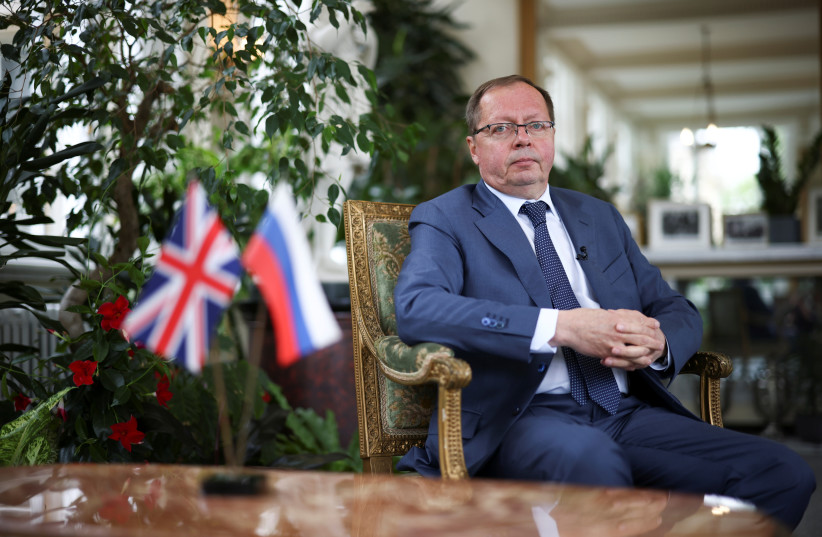Russia is unlikely to withdraw from a swathe of land across Ukraine's southern coast and will defeat Ukrainian forces in the whole of the eastern Donbas region, Russia's ambassador to London told Reuters.
Since the February 24 invasion, Russian forces have taken control of a big chunk of territory across Ukraine's southern flank above Crimea, which Russia annexed in 2014. Russia is slowly pushing Ukrainian forces out of two Russian-backed rebel regions of east Ukraine which it has recognized as independent states.
When asked how the conflict might end, Russian Ambassador Andrei Kelin said it was difficult to see Russian and Russian-backed forces withdrawing from the south of Ukraine, and that Ukraine's soldiers would be pushed back from all of Donbas.
"We are going to liberate all of the Donbas," Kelin told Reuters in an interview in his London residence where Winston Churchill used to discuss World War II strategy with Josef Stalin's ambassador.
"Of course it is difficult to predict the withdrawal of our forces from the southern part of Ukraine because we have already experience that after withdrawal, provocations start and all the people are being shot and all that."

Russia says Ukraine has repeatedly killed civilians in attacks on territory held by Russian backed separatists in Ukraine's Donbas since 2014. Fighting over the frontline in that region caused thousands of casualties on both sides long before Russia's invasion this year.
The ambassador's remarks give an insight into the potential Russian endgame in Ukraine: essentially a forced partition that would leave Russia's former Soviet neighbor shorn of more than one fifth of its post-Soviet territory.
Sooner or later, Kelin said, Ukraine would have to decide: strike a peace deal with Russia or "continue slipping down this hill" to ruin.
President Vladimir Putin on Thursday accused the West of decades of aggression towards Moscow and warned that if it wanted to attempt to beat Russia on the battlefield it was welcome to try, but this would bring tragedy for Ukraine.
"Is escalation possible? Of course," Kelin said. "If the flow of weapons is organized in such a way that it endangers our strategic situation, our defense, we will have to take serious measures against that."
Ignoring Russia's concerns
Kelin said the West did not understand the true causes of the conflict and had ignored Russia's concerns.
"The narrative is very short: Russia has been aggressive against an innocent Ukraine," Kelin said. "This is not true at all."
Putin says the "special military operation" in Ukraine is necessary because Moscow had to defend Russian-speaking people against persecution which he says the West has ignored.
He also casts the war as a necessary revolt against the United States, which he says has humiliated Russia since the 1991 fall of the Soviet Union by enlarging NATO eastwards and was using Ukraine to threaten Russia.
Europe 'does not understand Ukrainian nationalism'
Ukraine and its Western backers say that Putin has no justification for what they say is an imperial-style land grab against a country whose borders Moscow recognized as the Soviet Union collapsed.
Kelin said Ukraine had been preparing for war for some time, helped by the United States and Britain. Putin says Ukraine is being used by the West as part of a plan to weaken and even destroy Russia.
"I don’t think that Europe understands what Ukrainian nationalism is," Kelin said. The result: Russia is moving closer to China, he said.
"If sanctions will continue to be imposed on Russia, we will make a big turn to China and the East."
Russia warns Lithuania it could take 'harsh' measures over Kaliningrad transit
Russia warned Lithuania and the European Union on Friday that it could adopt "harsh measures" against them if the transit of some goods to and from the Russian exclave of Kaliningrad did not resume.
"If the situation does not stabilize in the coming days, then Russia will take harsh measures against Lithuania and the European Union," Maria Zakharova, spokesperson of the Russian foreign ministry, said in a statement. "The issue has taken too long to resolve."
Lithuania has banned the transit of goods subject to European Union sanctions across its territory to and from the Baltic exclave. Russia has pledged to retaliate.
